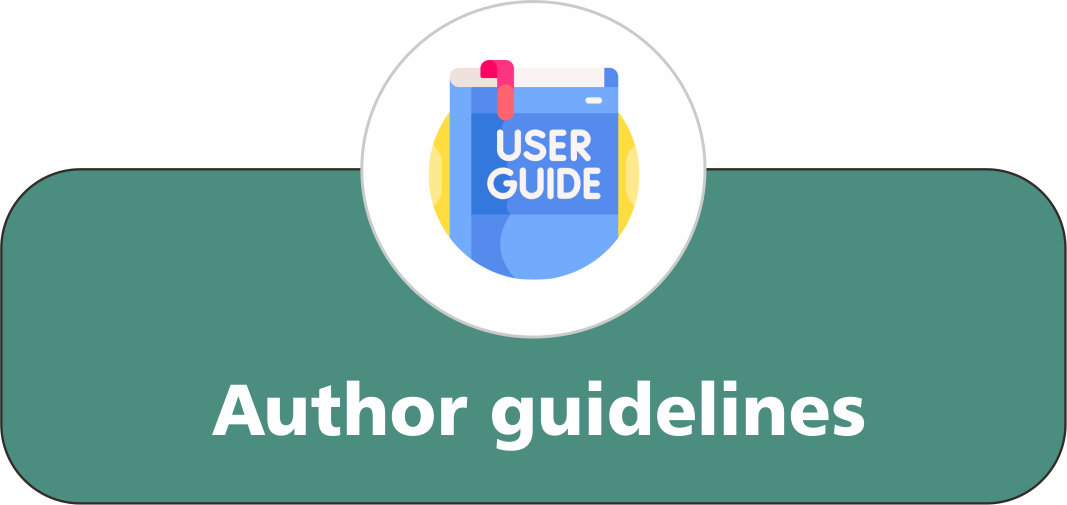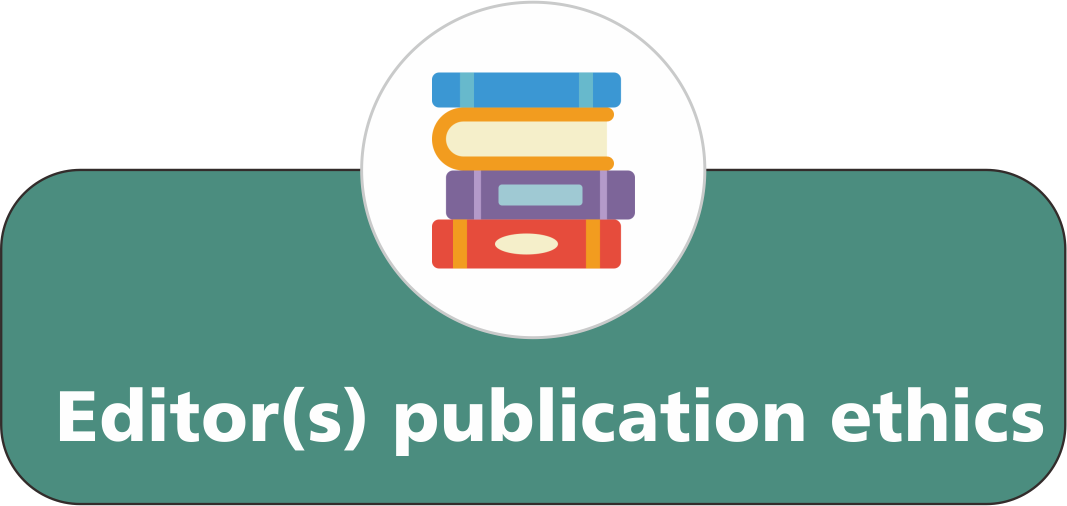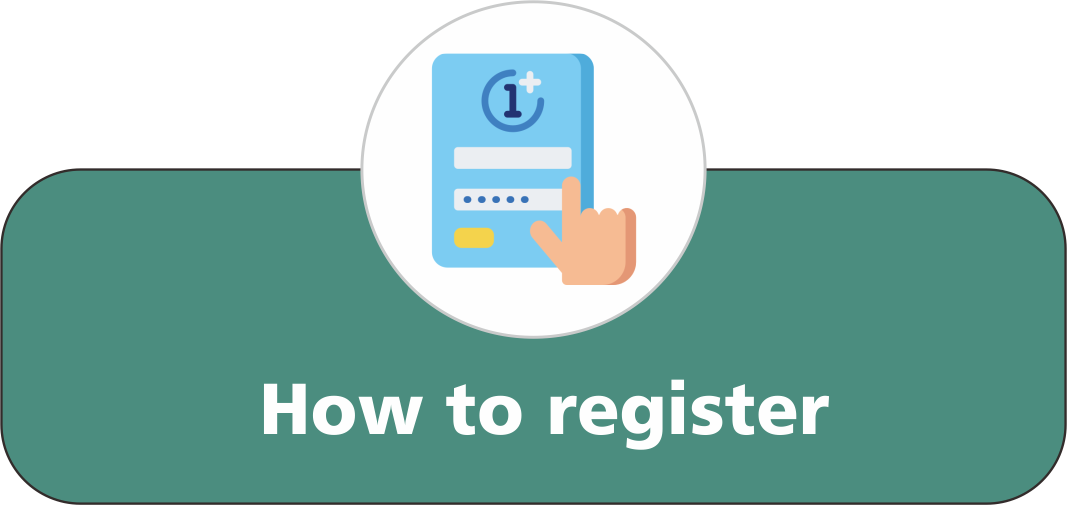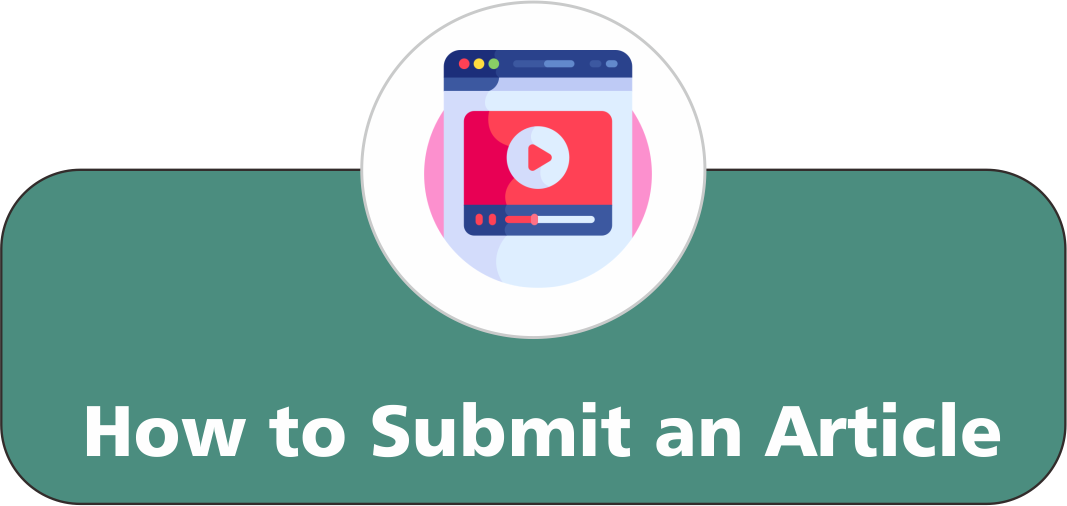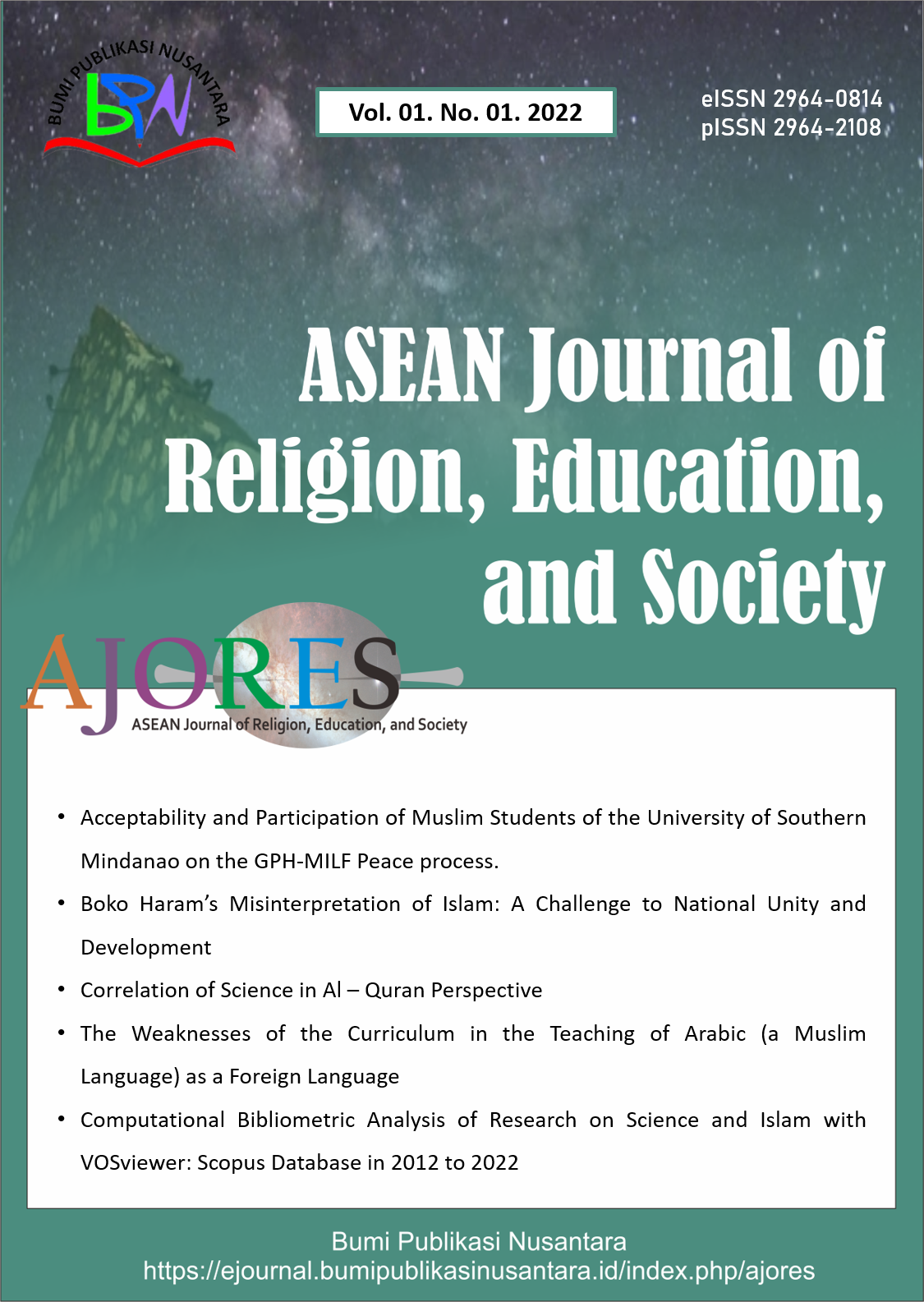Computational Bibliometric Analysis: Can Digital Transformation Improve the Quality of Islamic Learning?
 ), Munawar Rahmat(2),
), Munawar Rahmat(2),
(1) Universitas Pendidikan Indonesia
(2) Universitas Pendidikan Indonesia
 Corresponding Author
Corresponding Author
Abstract
Keywords
References
Al Husaeni, D. F., and Al Husaeni, D. N. (2022). Computational bibliometric analysis of research on science and Islam with VOSviewer: Scopus database in 2012 to 2022. ASEAN Journal of Religion, Education, and Society, 1(1), 39-48.
Al Husaeni, D. F., and Munir, M. (2023). Literature review and bibliometric mapping analysis: Philosophy of science and technology education. Indonesian Journal of Multidiciplinary Research, 3(2), 219-234.
Al Husaeni, D. F., and Nandiyanto, A. B. D. (2022a). Bibliometric computational mapping analysis of publications on mechanical engineering education using vosviewer. Journal of Engineering Science and Technology, 17(2), 1135-1149.
Al Husaeni, D. F., and Nandiyanto, A. B. D. (2022b). Bibliometric using Vosviewer with Publish or Perish (using google scholar data): From step-by-step processing for users to the practical examples in the analysis of digital learning articles in pre and post Covid-19 pandemic. ASEAN Journal of Science and Engineering, 2(1), 19-46.
Al Husaeni, D. N. (2022). Development analysis research on physical education by mapping keywords using the vosviewer application. ASEAN Journal of Physical Education and Sport Science, 1(1), 9-16.
Alfi, A. M., Febriasari, A., and Azka, J. N. (2023). Transformasi pendidikan agama islam melalui teknologi. Religion: Jurnal Agama, Sosial, dan Budaya, 1(4), 511-522.
Amalia, S., Hakim, L., and Ikhlas, I. (2023). Penggunaan blended learning system dengan model flip classroom dalam pembelajaran bahasa Arab (studi kasus Di MTsS. Sepatan). Al-Muyassar: Journal of Arabic Education, 2(1), 108-129.
Arif, M. B. (2016). Model pembelajaran ICT literacy m-learning untuk meningkatkan hasil belajar mata pelajaran pendidikan agama islam di MTs. Brawijaya Mojokerto. Brawijaya Mojokerto. TA’DIBIA Jurnal Ilmiah Pendidikan Agama Islam, 6(2), 113-122.
Barokah, J. (2023). Tren dan perkembangan dalam pembelajaran berbasis teknologi dalam pendidikan agama islam. GUAU: Jurnal Pendidikan Profesi Guru Agama Islam, 3(5), 202-213.
Bilad, M. R. (2022). Bibliometric analysis for understanding the correlation between chemistry and special needs education using vosviewer indexed by google. ASEAN Journal of Community and Special Needs Education, 1(2), 61-68.
Demmanggasa, Y., Sabilaturrizqi, M., Kasnawati, K., Mardikawati, B., Ramli, A., and Arifin, N. Y. (2023). Digitalisasi pendidikan: akselerasi literasi digital pelajar melalui eksplorasi teknologi pendidikan. Communnity Development Journal, 4(5), 11158-11167.
Efendi, N. M. (2018). Revolusi pembelajaran berbasis digital (Penggunaan animasi digital pada start up sebagai metode pembelajaran siswa belajar aktif). Habitus: Jurnal Pendidikan, Sosiologi, and Antropologi, 2(2), 173-182.
Fathurrochman, I., Endang, E., Bastian, D., Ameliya, M., and Suryani, A. (2021). Strategi pemasaran jasa pendidikan dalam meningkatkan nilai jual madrasah aliyah riyadus sholihin musirwawas. Jurnal Isema: Islamic Educational Management, 6(1), 1-12.
Fauziyati, W. R. A. (2023). Dampak penggunaan artificial intelligence (AI) dalam pembelajaran pendidikan agama islam. Jurnal Review Pendidikan dan Pengajaran (JRPP), 6(4), 2180-2187.
Gunawan, B., Ratmono, B. M., Abdullah, A. G., Sadida, N., and Kaprisma, H. (2022). Research mapping in the use of technology for fake news detection: Bibliometric analysis from 2011 to 2021. Indonesian Journal of Science and Technology, 7(3), 471-496.
Hadisi, L., and Muna, W. (2015). Pengelolaan teknologi informasi dalam menciptakan model inovasi pembelajaran (e-learning). Al-TA'DIB: Jurnal Kajian Ilmu Kependidikan, 8(1), 117-140.
Huda, M., Sudrajat, A., Muhamat, R., Mat Teh, K. S., and Jalal, B. (2019). Strengthening divine values for self-regulation in religiosity: insights from Tawakkul (trust in God). International Journal of Ethics and Systems, 35(3), 323-344.
Jamil, S. (2022). Teknologi dan pendidikan islam: Peluang dan tantangan dalam era digital. Wistara: Jurnal Pendidikan Bahasa dan Sastra, 3(1), 122-126.
Komarudin, K., and Irawati, I. (2023). Peningkatan literasi keagamaan melalui program bacaan al-quran interaktif di perumahan arraya cibatok. Jurnal Peradaban Masyarakat, 3(6), 234-237.
Latuconsina, A., Latuapo, R., Rahman, M. A., Rustina, N., and Rajab, L. (2023). Systematic review exploring trends in islamic education research: A bibliometric analysis. Migration Letters, 20(7), 1249-1267.
Maesaroh, S. (2013). Peranan metode pembelajaran terhadap minat dan prestasi belajar pendidikan agama Islam. Jurnal kependidikan, 1(1), 150-168.
Maryanti, R., Nandiyanto, A. B. D., Hufad, A., Sunardi, S., Al Husaeni, D. N., and Al Husaeni, D. F. (2023). A computational bibliometric analysis of science education research using VOSviewer. Journal of Engineering Science and Technology, 18(1), 301-309.
Maryanti, R., Rahayu, N. I., Muktiarni, M., Al Husaeni, D. F., Hufad, A., Sunardi, S., and Nandiyanto, A. B. D. (2022). Sustainable development goals (SDGs) in science education: Definition, literature review, and bibliometric analysis. Journal of Engineering Science and Technology, 17, 161-181.
Mawardi, A. (2023). Edukasi pendidikan agama islam dalam pemanfaatan sumber-sumber elektronik pada siswa madrasah ibtidaiyah. Journal on Education, 6(1), 8566-8576.
Mawardi, A. (2023). Edukasi pendidikan agama islam dalam pemanfaatan sumber-sumber elektronik pada siswa madrasah ibtidaiyah. Journal on Education, 6(1), 8566-8576.
Miasan, N. A., and Kasim, T. S. A. T. (2018). Pengamalan M-pembelajaran dalam kalangan guru novis pendidikan islam di sabah: The practices of m-learning among islamic education novice teachers in sabah. Journal of Islamic Educational Research, 3, 11-20.
Misbah, M., Hamidah, I., Sriyati, S., and Samsudin, A. (2022). A bibliometric analysis: Research trend of critical thinking in science education. Journal of Engineering Science and Technology, 17, 118-126.
Nursaniah, S. S. J., and Nandiyanto, A. B. D. (2023). Bibliometric analysis for understanding “science education” for “student with special needs” using vosviewer. ASEAN Journal of Community and Special Needs Education, 2(1), 45-54.
Oktavia, P., and Khotimah, K. (2023). Pengembangan metode pembelajaran pendidikan agama islam di era digital. An Najah (Jurnal Pendidikan Islam dan Sosial Keagamaan), 2(5), 66-76.
Ragadhita, R., and Nandiyanto, A. B. D. (2022). Computational bibliometric analysis on publication of techno-economic education. Indonesian Journal of Multidiciplinary Research, 2(1), 213-222.
Rahmadani, N. S., and Setiawati, M. (2019). Aplikasi pendidikan online “ruang guru” sebagai peningkatan minat belajar generasi milenial dalam menyikapi perkembangan revolusi industri 4.0. Bahastra: Jurnal Pendidikan Bahasa dan Sastra Indonesia, 3(2), 241-246.
Rahman, F., Syah, H., Cahyadi, A., and Sabda, S. (2023). Quantum ikhlas: Kajian, analisis, dan implementasinya dalam pendidikan islam. Jurnal Alwatzikhoebillah: Kajian Islam, Pendidikan, Ekonomi, Humaniora, 9(1), 34-48.
Railean, E. A., and Railean, E. A. (2017). Impacts of digital revolution on learning. User Interface Design of Digital Textbooks: How Screens Affect Learning, 2017, 1-22.
Riandi, R., Permanasari, A., and Novia, N. (2022). Implementation of biotechnology in education towards green chemistry teaching: A bibliometrics study and research trends. Moroccan Journal of Chemistry, 10(3), 10-3.
Riyanto, A. (2023). Guru pendidikan agama islam dimasa teknologi informasi dan komunikasi. Al Kasyaf (Jurnal Pendidikan dan Dakwah), 1(1), 1-10.
Romadanti, L. (2023). Evolusi metode pembelajaran pendidikan agama islam. GUAU: Jurnal Pendidikan Profesi Guru Agama Islam, 3(5), 231-242.
Salamah, W. (2020). Deskripsi penggunaan aplikasi google classroom dalam proses pembelajaran. Jurnal Penelitian Dan Pengembangan Pendidikan, 4(3), 533-538.
Shobirin, M. S., Qomar, M., and Aziz, A. (2023). Kebijakan transformasi digital madrasah aliyah unggulan kh. abd wahab hasbulloh bahrul'ulum Tambakberas Jombang. JoEMS (Journal of Education and Management Studies), 6(3), 9-15.
Sholikhakh, R. A., Suryadi, D., Kusnandi, K., and Supriyadi, E. (2023). Bibliometric analysis of didactical transposition on teaching and learning process. Journal of Engineering Science and Technology, 18, 48-55.
Solehuddin, M., Muktiarni, M., Rahayu, N. I., and Maryanti, R. (2023). Counseling guidance in science education: Definition, literature review, and bibliometric analysis. Journal of Engineering Science and Technology, 18, 1-13.
Sukyadi, D., Maryanti, R., Rahayu, N. I., and Muktiarni, M. (2023). Computational bibliometric analysis of english research in science education for students with special needs using vosviewer. Journal of Engineering Science and Technology, 18, 14-26.
Syahri, A. (2018). Spirit Islam dalam teknologi pendidikan di era revolusi industri 4.0. Attarbiyah, 28, 62-80.
Taraju, A. R., Nurdin, N., and Pettalongi, A. (2022). Tantangan dan strategi guru menghadapi era revolusi industri 4.0. Prosiding Kajian Islam dan Integrasi Ilmu di Era Society (KIIIES) 5.0, 1(1), 311-316.
Taufik, T., and Udhmah, S. (2021). Optimalisasi potensi pemanfaatan open education resources pada pembelajaran agama islam. Jurnal Bidang Pendidikan Dasar, 5(2), 120-134.
Wahidin, U. (2018). Implementasi literasi media dalam proses pembelajaran pendidikan agama Islam dan budi pekerti. Edukasi Islami: Jurnal Pendidikan Islam, 7(02), 229-244.
Yuliatun, Y. (2018). Mengembangkan kecerdasan spiritual anak melalui pendidikan agama. ThufuLA: Jurnal Inovasi Pendidikan Guru Raudhatul Athfal, 1(1), 153-172.
Article Metrics
Abstract View : 1061 times
: 1061 times Download : 621 times
Download : 621 times
Refbacks
- There are currently no refbacks.
Copyright (c) 2023 Bumi Publikasi Nusantara

This work is licensed under a Creative Commons Attribution-ShareAlike 4.0 International License.


